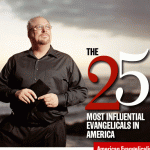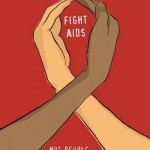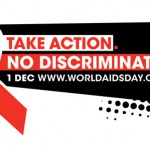As the Gregorian calendar year officially comes to a close, we offer once again a sampling of the year’s top ten sexual stories. While certainly not a complete, in-depth, or globally representative list, we do think that this list contains snippets that have both disturbing and hopeful implications for sexual justice.
10. Rick Perry steals gay, secular icons to create anti-gay Christmas message

“By now, you’ve probably seen Rick Perry’s “Strong” ad, in which he opines, “There’s something wrong in this country when gays can serve openly in the military but our kids can’t openly celebrate Christmas or pray in school.” Not only are gays in our military, they’re also composing music for our campaign ads. As the Harvard Political Reviewpoints out, the music that plays in the background of Perry’s ad is inspired by or directly taken from Aaron Copland, a gay composer.” (Nick Greene, Dec. 10, 2011, Village Voice).
 Presidential hopeful Herman Cain’s campaign abruptly crashed and burned after news media learned of his long time extra-marital lover. But this was after his multiple cases of sexual harrassment and assault against his former employees were also aired. Most news media, including reputable news outlets like the Washington Post, failed to differentiate between Cain’s alleged criminal and consensual acts, using the language of “accusation” to describe both. See for example this story with a headline of “Ginger White accuses Herman Cain of long affair.”
Presidential hopeful Herman Cain’s campaign abruptly crashed and burned after news media learned of his long time extra-marital lover. But this was after his multiple cases of sexual harrassment and assault against his former employees were also aired. Most news media, including reputable news outlets like the Washington Post, failed to differentiate between Cain’s alleged criminal and consensual acts, using the language of “accusation” to describe both. See for example this story with a headline of “Ginger White accuses Herman Cain of long affair.”
…”Cain denied the accusations. In an interview that aired before White’s allegations were broadcast, Cain told CNN’s Wolf Blitzer that he knows White and that the two had been friends but that there had been no sexual contact and no “affair.” He characterized their relationship as “trying to help a friend” because of her “not having a job etcetera and this sort of thing.””
The story then goes on to simply state that:
“This month, Cain was accused of sexually harassing several women.”
Such lack of differentiation between criminal and consensual sexual scandals is common among contemporary American mainstream media. Gratefully, Amanda Marcotte (Alternet, Nov. 30, 2011) provides a helpful guide for assessing the significance different kinds of sex scandals. See Marcotte’s article here: “6 Kinds of Sex Scandals: What Should be exposed? What should be left private?”
8. Wienergate
 … AND speaking of the need to have more sophisticated interpretative filters around why and how some Wieners constitute a “scandal” … see article above, again. … See also our post about Anthony Weiner:
… AND speaking of the need to have more sophisticated interpretative filters around why and how some Wieners constitute a “scandal” … see article above, again. … See also our post about Anthony Weiner:
“In contrast to the Dutch, Americans love sex scandals. We love them so much that in a good year we produce and consume not just one of these high-profile scandals, but several. For many of us interested in sexual justice, the juiciest stories are those of the hypocrites: the Elliot Spitzers who lead anti-prostitute campaigns while purchasing sex; the George Rekers who champion the anti-gay movement while hiring “rent boys,” and the Newt Gingrichs who lead impeachment hearings while engaging in their own extra-marital affairs.”
7. Obama’s Secretary of Health & Human Services overrules the FDA, pulls “morning after” pill

“In what can only be called an astounding move by an Administration that pledged on inauguration day that medical and health decisions would be based on fact not ideology and for which women are a major constituency, today Kathleen Sebelius, Secretary of the Department of Health and Human Services (HHS) overruled a much-awaited decision by the U.S. Food and Drug Administration (FDA) to make emergency contraception (EC) available over-the-counter (OTC) to women of all ages.
According to the New York Times, “no health secretary has ever [overruled an FDA decision] before.” See Jodi Jacobsen’s full story in RhReality Check here.
6. The politics of Rape. Rape committed by men against women was frequently in the news during 2011, not because the dynamics of it have changed (it’s always about maintaining/exerting symbolic power), but because some people and institutions have found new tactics of exerting and/or maintaining heterosexism. Here’s a sampling of three such tactics.

- House Republicans try to change definition of Rape (as a way to further erode abortion rights). Note connection to story #5 above.
- “Corrective rape” campaigns [as discipline for non-heteronormative women in (township/impoverished areas of) South Africa.]
- High school cheerleader raped by athlete and then kicked off squad (for refusing to cheer for her rapist).
5. Penn State & masculinist cultures of sexual abuse. Rape and sexual abuse committed by men against boys was again in the news this year. While the Catholic Church and the Military managed to avoid serious spotlight time in 2011, another site of masculine privileged culture — American college football –wasn’t as lucky.
“With former Penn State football assistant coach Jerry Sandusky charged with sexually abusing children—and school officials including iconic former football coach Joe Paterno dismissed for purportedly failing to report Sandusky’s alleged crimes to law enforcement—many observers have compared the situation to a series of similar cases that have rocked the Vatican.”
See: What the Catholic Church can teach us about the Penn State Scandal.” (Patrick Hruby, The Atlantic, Nov. 16, 2011.)
After all these dire (and at times ludicrous) sexual stories, we will end with four stories on a slightly more hopeful note …
4. Mainstreaming of Transgender stories (including both opportunities and misses for gender transformation).

While images of Chaz Bono’s new book and his stint with Dancing with the Stars were ubiquitous, the inclusion of transgender individuals in policies and programs were just as, if not more, influential. Any sort of mainstreaming can bring missed opportunities for radical transformation (in this case for the institution of gender). But Mara Keisling, executive director of the National Center for Transgender Equality details 14 reasons why 2011 was “a game-changing year for transgender rights.” (See full story in The Advocate, Dec. 28, 2011).
3. Sex workers rights recognized by the UN and US State Department
 (Meanwhile the conservative sexual politics of mainstream anti-trafficking rhetoric became increasingly exposed. See: for example, social justice activist Emi Koyama’s brilliant investigative article in Bitch Magazine, American University Human Rights professor Ann Jordan’s series of critical papers exposing the “Hype” of the abolitionist/trafficking movement, as well as of course the Village Voice’s mocking of Ashton Kutcher’s “real men” campaign.)
(Meanwhile the conservative sexual politics of mainstream anti-trafficking rhetoric became increasingly exposed. See: for example, social justice activist Emi Koyama’s brilliant investigative article in Bitch Magazine, American University Human Rights professor Ann Jordan’s series of critical papers exposing the “Hype” of the abolitionist/trafficking movement, as well as of course the Village Voice’s mocking of Ashton Kutcher’s “real men” campaign.)
2. Secretary of State Hillary Clinton delivers historic gay rights speech to the United Nations
GENEVA — The Obama administration announced on Tuesday that the United States would use all the tools of American diplomacy, including the potent enticement of foreign aid, to promote gay rights around the world.
In a memorandum issued by President Obama in Washington and in a speech by Secretary of State Hillary Rodham Clinton here, the administration vowed to actively combat efforts by other nations that criminalize homosexual conduct, abuse gay men, lesbians, bisexuals or transgendered people, or ignore abuse against them. (Myers and Cooper, New York Times, Dec. 8, 2011).
1. The Sexual Politics of Egypt’s Arab Spring, featuring:
- Aliaa Mahdy (AKA The naked blogger)

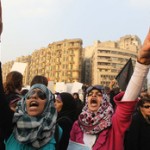 Egyptian women protesting abuse by Military
Egyptian women protesting abuse by Military- “Virginity tests” inflicted upon Egyptian women protestors declared illegal by Egyptian judge.
Happy New Year from Sexuality & Society! Thanks to all the activists and scholars working toward sexual and social justice; may 2012 be filled with your stories!
Warm regards, Kari Lerum and Shari Dworkin
————————————————
Related Sexuality & Society stories:
- https://thesocietypages.org/sexuality/2010/12/31/top-10-sexual-stories-of-2010/
- https://thesocietypages.org/sexuality/2009/12/31/top-ten-sexual-stories-of-2009/

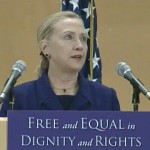


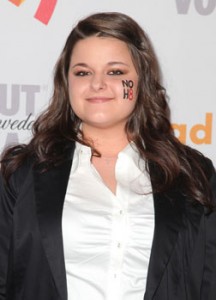




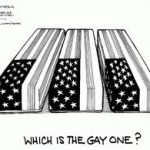
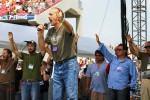
 January 13, 2010 – 7:00am
January 13, 2010 – 7:00am

 NEW YORK: “President Museveni, Ethics Minister Nsaba Buturo and MP David Bahati have been linked to a shadowy religious fundamentalist group in the United States known as the ‘The Family’. …According to journalist, academic and author Jeff Sharlett, who has spent years researching on The Family, its core agenda includes fighting homosexuality and abortion, promoting free-market economics and dictatorship, an idea they once termed ‘totalitarianism for Christ’. “
NEW YORK: “President Museveni, Ethics Minister Nsaba Buturo and MP David Bahati have been linked to a shadowy religious fundamentalist group in the United States known as the ‘The Family’. …According to journalist, academic and author Jeff Sharlett, who has spent years researching on The Family, its core agenda includes fighting homosexuality and abortion, promoting free-market economics and dictatorship, an idea they once termed ‘totalitarianism for Christ’. “
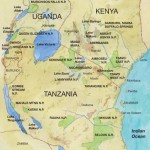
 “Uganda’s new
“Uganda’s new 